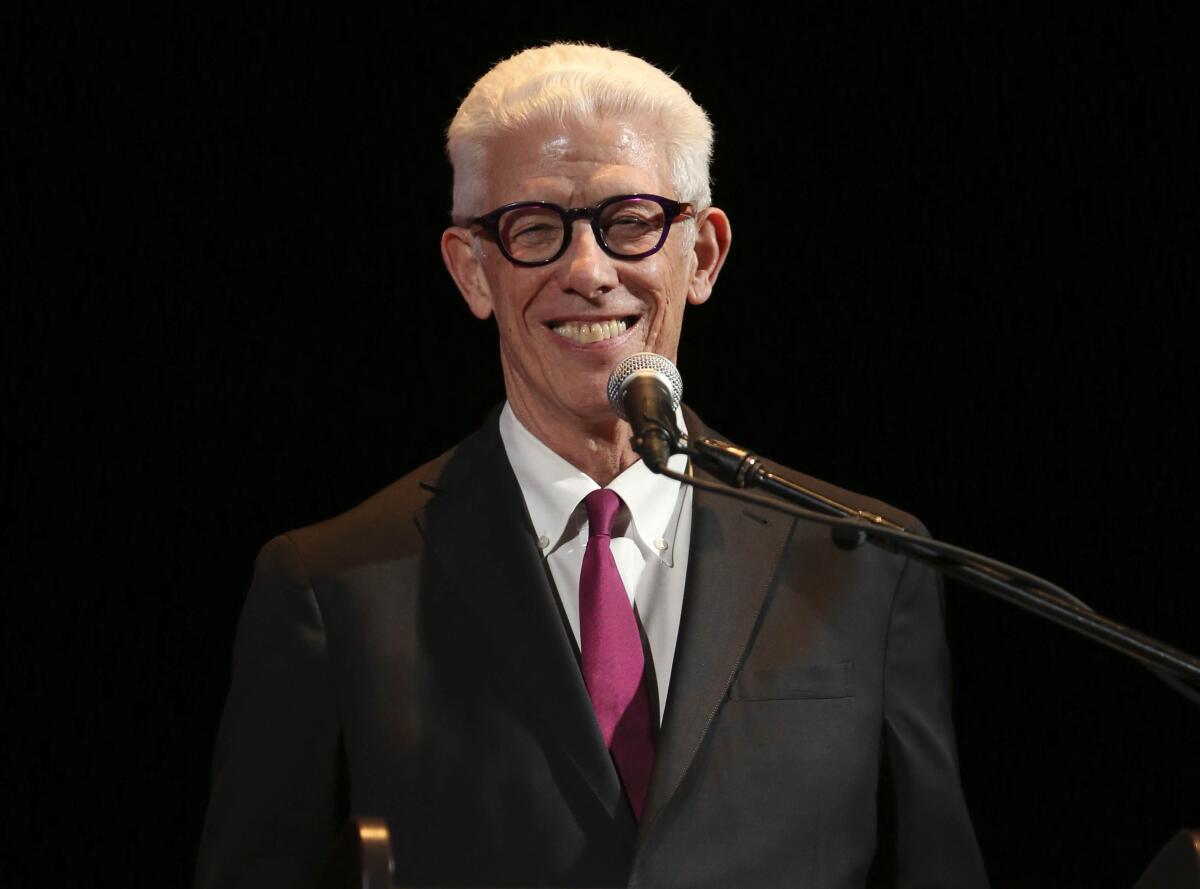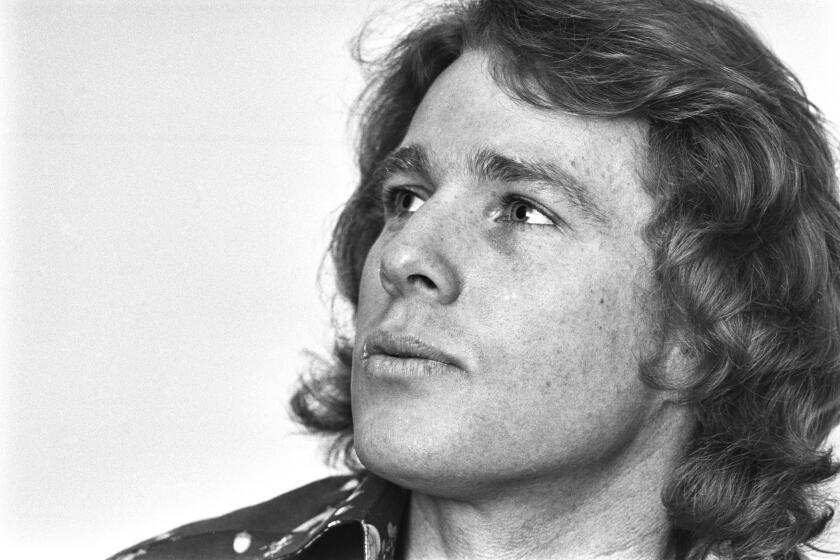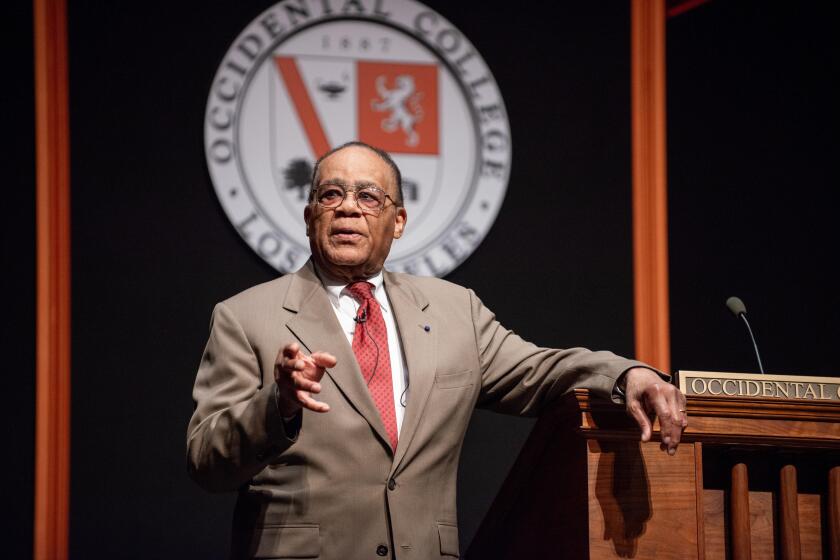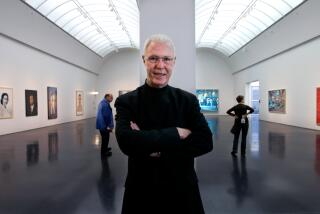Ken Brecher, anthropologist and longtime champion of Los Angeles humanities, dies at 78

- Share via
In a single lifetime, Ken Brecher lived many lives.
The longtime president of the Library Foundation of Los Angeles, Brecher also spent more than a decade leading the Sundance Institute and served as associate artistic director of the Mark Taper Forum in downtown Los Angeles.
Each role provided him the opportunity to touch people’s lives and embrace their mutual humanity, an ambition that sprang from his studies as a cultural anthropologist, according to those who knew him.
Among those whose work and lives reflect his influence is journalist Susan Orlean, who credits Brecher with inspiring her 2018 bestseller, “The Library Book,” about the 1986 fire at the Los Angeles Central Library. Brecher had reached out to Orlean after she moved to L.A. and led her on a tour of the historic library in downtown Los Angeles, telling her the story of the famous fire that planted the seed for her book.
“He was perhaps the most luminous, vibrant person I’ve ever known,” Orlean told The Times.
Brecher died Monday of complications from cancer at the age of 78, according to Rebecca Rickman, his widow.
Born in Philadelphia on Oct. 4, 1945, Brecher got his start in anthropology at Cornell. While at Oxford on a Rhodes scholarship, he learned of an expedition to the Amazon that would prove life-changing.
Brecher would go on to spend two years exploring the vast Brazilian rainforest, living among 15 Indigenous tribes during that period, where he was one of the first Americans to contact the remote Wausha tribe. The experience shaped not only his life as an anthropologist but also his worldview.
Ryan O’Neal, who starred in ‘Love Story’ and ‘Paper Moon,’ cementing his status as a heartthrob in the ‘70s, died Friday. He was 82.
He recounted his time in South America in his 1988 memoir, “Too Sad to Sing: A Memoir With Postcards.”
“In a forest that I knew to be inhabited by jaguars and snakes and grasses as sharp as razor blades and even hostile tribes, I had the sense of coming into my own house,” he wrote.
In public speaking appearances, he often made reference to his training as an anthropologist, studying tribes and customs and belief systems to find the fundamental humanity that connects us all.
“He never lost sight of the people that he lived with for two years,” said longtime friend Robert Marx. “When he met strangers, whether in New York or Paris or Los Angeles or anywhere, it was just a variation of when he was a functioning anthropologist in Brazil that brought him this human perspective.”
Brecher moved to Los Angeles in 1974 after an invite by the Mark Taper Forum’s founder and artistic director, Gordon Davidson, who was staging a production of Christopher Hampton’s play “Savages.” Brecher’s work as a consultant on the play impressed Davidson so much that he hired him as associate artistic director, and Brecher went on to shape the theater’s lineup into the 1980s.
He made it a priority to bring in a diversity of stories and perspectives. Among productions Brecher oversaw were the groundbreaking Chicano play “Zoot Suit” and the story of a deaf school in “Children of a Lesser God,” both of which premiered at the Taper under Brecher’s creative direction.
“To us, he was thinking outside the box,” said Madeline Puzo, the Taper’s stage manager at the time. “But in retrospect, he was looking at the work we did at the Taper as an anthropologist,” to explore a variety of human cultures.
After leaving the Taper in the mid-1980s, Brecher took a sabbatical in Paris before moving to Boston to lead the Boston Children’s Museum. He followed that with a short stint heading the William Penn Foundation, a Philadelphia-based philanthropic organization.
In 1996, Robert Redford recruited Brecher to be the executive director of the Sundance Institute, where he served for the next 13 years. His time at Sundance saw the creation of the institute’s documentary program and documentary fund.
The famed film festival posted a tribute to Brecher on its Facebook page Thursday.
“An anthropologist, author, Rhodes Scholar, collector of eccentric objects, and passionate believer in the transformative power of art, Ken supported the creation of Sundance’s New Frontier program, Documentary Fund and Film Music Program, while fostering the growth of our artist development programs, particularly internationally,” the tribute read.
John Brooks Slaughter, a trailblazing engineer who pushed diversity in his many leadership roles, had died at 89.
In 2010, Brecher was named the president of the Library Foundation of Los Angeles, the private nonprofit arm of the L.A. Library. As Brecher explained in a 2011 interview with The Times’ Patt Morrison, the city pays for the library’s daily operation and upkeep, while the foundation is responsible for events and programming, whether it’s book clubs and guest readings, literacy programs or after-school homework help.
His advocacy at the foundation helped in the passage of Measure L, which increased funding to allow L.A. public libraries to be open seven days a week.
Brecher’s leadership was not without controversy. In 2018, he fired Louise Steinman, the founding director of the library’s ALOUD lecture series, leading to calls for his resignation. Brecher wrote an op-ed in The Times defending his decision, arguing that the move was needed to reshape the lecture series into something that diversified its perspectives and broadened its audience.
“ALOUD must change. Building on its strong tradition, we will expand this series to reach a larger section of L.A.’s cultural life,” he wrote. “And we will do it by diversifying its events, its audience and its venues to engage with all of Los Angeles.”
During his decade at the helm, Brecher oversaw several major expansions in the L.A. Library’s collections and coordinated fundraising support for new programs including “Teens Leading Change,” a civic engagement program for adolescents. He retired from the position in 2021.
“What the library’s going to be by the end of the 21st century? It’s up to us to figure out a way to sustain it,” he told Morrison in 2011. “Nothing to me is more at the forefront of thinking than libraries.”
Brecher is survived by wife Rebecca Rickman and their son, Piers Brecher.
More to Read
Sign up for Essential California
The most important California stories and recommendations in your inbox every morning.
You may occasionally receive promotional content from the Los Angeles Times.
















